Getting into elite schools like Harvard, Yale, Princeton, Stanford, and others is a goal of many high school students. How exactly to accomplish this is often a mystery to students and parents going through the admissions process. Lots of unhelpful and vague advice abound, especially from people who have never gained admission themselves to these schools.
In high school, I got into every school I applied to, including Harvard, Princeton, MIT, and Stanford, and I attended Harvard for college. I also learned a lot about my classmates and the dynamics of college admissions in ways that were never clear to me in high school. Now I’m sharing this expertise with you.
Here I’ve written the most comprehensive guide to getting into top schools that I’ve ever seen. I’m going to explain in detail what admissions officers at Ivy League schools are really looking for in your application. Importantly, I’m going to share an actionable framework you can use to start planning how you can build the most compelling application that’s unique to you.
Brief Overview
If there’s one central takeaway from this article, it’s that most students are spending their time on entirely the wrong things, because they have a wrong view of what top colleges are really looking for. If you’re struggling to stay afloat with a ton of AP classes in subjects you don’t care about, a sports team, SAT/ACT prep, and volunteering, you’re hurting yourself, and you’re probably incredibly unhappy.
We’ll drill down into exactly why this is such a huge mistake.
This article is made of the following major sections:
- Why schools exist, and what they want to achieve
- What top schools like Harvard and Princeton are looking for: deep achievement
- Why Ivy League admissions shouldn’t be a crapshoot for you, if you do things right
- How to accomplish deep achievement
- Why you’re likely wasting at least 1000 hours on things that don’t matter
- Frequently Asked Questions
This article is long and detailed, but I strongly believe it’s well worth your time. These are all the lessons I wish I had known when I was in high school myself. So I suggest you read it through fully at least once.
When you finish reading this guide, I believe you’ll dramatically change your beliefs about how to get into Stanford, Harvard and other Ivy League level schools.

Important Disclaimers
Before we dive in, I need to get a few things out of the way. My advice in this article is blunt and pragmatic, and I have strong opinions. If one of my points rubs you the wrong way, I don’t want one bad apple to spoil the bunch. You might end up ignoring advice that would otherwise be helpful. So let me clear up some common misconceptions about what I’m saying.
First of all, it’s completely OK if you don’t go to Harvard. Going to Harvard or Yale or Stanford won’t guarantee your success in life. Lots of students who go to these schools end up aimless, and many more people who don’t go to top schools end up accomplishing a huge amount. More than anything, your success in life is up to yourself – not your environment, and not due to factors out of your control. The school you go to is not going to guarantee your own success. So whether you get into a top school or not, it’s only the beginning of a long road, and what happens during your journey is almost entirely up to you.
(That said, I believe going to a top school gives you huge advantages, particularly in the availability of resources and the strength of the community. If I had to do it all over, I would 100% have gone to Harvard again. More on this later.)
I don’t believe that getting into a top school like Stanford or Duke should be the singular goal of high school students. Happiness and fulfillment are really important and are rarely taken seriously enough. Luckily, with the approach to admissions that I explain below, you’ll be able to explore your passions while also building a strong application.
This article is a guide to admissions to the top schools in the country. To be explicit, I include in this the most selective schools in the Ivy League (consisting of Harvard, Yale, Princeton, University of Pennsylvania, Columbia) as well as Stanford, MIT, Duke, and Caltech. Generally speaking, these are the top 10 schools according to US News and have admissions rates below 10%. Following this guide is really helpful for these ultra-selective schools and important for raising your chances at these schools.
There’s a second group of high quality schools for whom admissions is relatively easier (Dartmouth, Johns Hopkins, Northwestern, Wash U in St Louis, Cornell, Brown, Notre Dame, Vanderbilt, Rice, UC Berkeley – ranked #11-20 in US News). If these are your target schools, and you follow the advice in this guide, you will absolutely blow admissions at this latter group away and get accepted into every one of them. Big claims, I know, but I stand by my advice here- you’ll see.
More than a guide on how to get into Stanford or how to get into MIT, this is really a guide on how to explore your passion and structure your life around that. I believe the strongest way of getting in is to do things you’re sincerely interested in – getting into schools is really just a consequence of that. Keep that in mind as you read the below. As you’ll see, trying to do things only for the sake of getting into a top school can be counterproductive and quite painful.
Throughout this article, I’m going to sound a bit elitist. For example, I’m going to refer to what it takes for you to be “world-class” and what it means for you to be “mediocre.” This might sound distasteful, as it sounds like I’m judging some efforts to be more worthwhile than others. Try not to be turned off by this. Michael Phelps is a world-class swimmer, and I am a terribly mediocre one. Facts are facts, and I’m just presenting how admissions officers think about comparing you to the 30,000 other applicants from the rest of the world.
I currently run a company called PrepScholar. We create online SAT/ACT prep programs thatadapt to you and your strengths and weaknesses. I believe we’ve created the best prep program available, and if you feel you need to raise your SAT/ACT score, then I encourage you to check us out. I want to emphasize that you do NOT need to buy a prep program to get a great score, and the advice in this guide has little to do with my company. But if you’re aren’t sure what to study and agree with our unique approach, our program may be perfect for you.
Lastly, this is not a reductionist magic guide on how to get into Stanford or MIT. There are no easy hidden tricks or shortcuts. There is no sequence of steps you can follow to guarantee your personal success. It takes a lot of hard work, passion, and some luck. But if it weren’t hard, then it wouldn’t be so valuable of an accomplishment. Most people who read this guide won’t be able to implement it fully, but I hope you take elements from it to change how you view your college admissions path.
With all that said, I hope you can take what I say below seriously and learn a lot about how colleges think about admissions. If you disagree with anything fundamental below, let me know personally through a comment. I strongly believe in what I’m saying, and most of my friends and colleagues who went to top schools would agree with this guide.
Why Schools Exist, and What They Want to Accomplish
To fully understand my points below on how to get into Yale and similar schools, we need to first start at the highest level: what do top schools hope to accomplish by existing? This will give clues to how it decides what types of students it’ll admit.
All top schools like Harvard, UPenn, and Duke are nonprofits, which means unlike companies like Starbucks, they don’t exist to create profits for shareholders.
But they do something similar – they aim to create as much value as they can in the world.Value can come in a lot of forms. A common one you hear about often is research. Through research by faculty members, schools push the boundaries of human knowledge and contribute toward new inventions and theories that can dramatically improve human lives. If you’ve ever heard a news story that says, “A team at Stanford today reported that they found a new treatment for pancreatic cancer,” you can bet that Stanford’s darn proud of that team.
Another one is through services. Universities often organize programs to consult with national governments or assist nonprofits. Another way of creating value is publishing books and disseminating research information. And the list goes on and on.
There’s another huge way schools create value – by educating its students, who then individually go on to do great things in the world.
Do you know where Bill Gates went to college? You likely know that it was Harvard (even though he dropped out). Don’t you think Harvard is thrilled to be associated with Bill Gates so publicly, and to be a part of his lore?

And how about Larry Page and Sergey Brin, founders of Google? You may know they went to Stanford.
President Barack Obama went to Columbia as an undergrad and then to Harvard for law school.
And so on with many other notable people at other schools. Every single school has alumni who make their schools proud. (Can you think of any from, say, U Chicago or Princeton?) By accomplishing great things in their lives, these alumni carry forward the flag of their alma mater, and the school gets associated with their accomplishments.
Think of schools like parents, and students as their children. The parents provide a nurturing environment for their children, who will then go on and do great things. The parents are proud whenever the children accomplish anything noteworthy. (And then, if the children make it big, they might give some money back to the parents.)
To see proof of this in action, visit the News office website of any school. All schools publicizethe world-changing things that are happening at the school and by its graduates.
Why do they do this? Because it generates positive feedback loops (remember this from biology?), aka virtuous cycles. The better the achievements at a school, the better the reputation it has. The better the reputation, the more funding it gets, and the better the students who want to attend. The better the students, the better the achievements the school creates. And this continues perpetually – such that places like Harvard will likely remain at the top of the education game for a very long time.
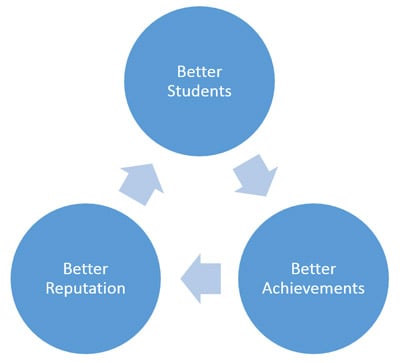
So now we know that schools like Princeton and MIT care about creating as much value as they can, including educating its students. Now the important question – what does this mean about what they look for in their next class of freshmen?
What type of students do Ivy League schools want to admit, and why?
Let’s cut to the chase. Schools are looking for two things when admitting students:
- Students who are going to accomplish world-changing things.
- Students who are going to contribute positively to the community while in college, to help each other accomplish great things afterward.
That’s essentially it.
For every student who enters the next class at Harvard or Stanford, the school hopes that that student is going to leave and change the world. Again, this can be in a multitude of ways. That person might start the next huge company. She might join a nonprofit and manage a large global health initiative. He might write a novel that wins the Pulitzer Prize. He might even “just” become a great parent to children who will then also go on to do great things.
Here’s some proof of this from Dean Fitzsimmons, long-time Dean of Admissions at Harvard College:
“Each year we admit about 2,100 applicants. We like to think that all of them have strong personal qualities and character, that they will educate and inspire their classmates over the four years of college, and that they will make a significant difference in the world after they leave Harvard.”
Source: NYTimes
This of course is hard to predict when you’re just 17 years old. You’ve barely developed, you don’t know exactly what you want to do with your life, and you have a lot of room to grow. But the college application process, as it’s designed now, is the best way that colleges currently have to predict which students are going to accomplish great things.
Your job is to convince the school that you’re that person.
This naturally leads to the next question:
How do you predict who’s going to change the world?
This is the challenge that all colleges face. Based on the first 17 years of your life, top colleges like Stanford and U Chicago want to determine the potential you have to make an impact throughout the rest of your life.
In trying to do this, top colleges adhere to one golden rule: The best predictor of future achievement is past achievement.
If you make deep achievements as a high school student, in the college’s eyes, you’re showing that you’re capable of achieving great things in the future.
This rule actually holds true in a lot of scenarios outside of college admissions. In college football, the Heisman trophy is given annually to the top player. Then, in the NFL draft, Heisman trophy winners are often picked in the first round – they’ve proven that they have a huge likelihood of succeeding.
Same goes with decisions you might make in your everyday life. If you’re looking for an orthodontist to straighten your teeth, you’re probably much more comforted by someone who has shown years of results and happy smiles. You’d probably avoid the rookie dentist just out of dental school who doesn’t have a lot of case history to point to.
The point of your application is to convince the school that, based on your achievements so far, you are going to continue succeeding and achieving great things in college and beyond.
Of course this isn’t perfect. The past doesn’t always predict the future. Tom Brady, star quarterback of the New England Patriots football team, was a no-name when he was drafted in 2000. He didn’t have a standout college football history, and he was drafted as the 199th pick in the 6th round. Similarly, even though you might not have a stellar college application, you might still achieve great things in your career.

Pretty much every football team wishes they’d drafted Tom Brady earlier.
Colleges do make mistakes, but by and large, they try to adhere to this rule to predict future success.
To get into a top school, you need to demonstrate the ability to succeed in the future by achieving great things now.
This idea might not be new to you. “Duh, Allen – of course Harvard wants to admit students who accomplish great things.”
But most likely you’re making a mistake in how you demonstrate that you’re world-class and capable of accomplishing great things. Most students tackle this in entirely the wrong way. They try to be “well-rounded,” thinking this is the best thing colleges want to see.
This is a big mistake.
The critical flaw with being well-rounded
Most students aiming for top schools make the huge mistake of trying to be “well-rounded.”When I was in high school, I heard this over and over and over again, from older students to teachers to counselors to supposed “college admissions experts.” I’m sure you might have heard of this already.
The typical student trying to be “well-rounded” will try to demonstrate some competency in a variety of skills. She’ll learn an instrument, play a JV sport, try to get straight A’s, score well on tests, volunteer for hundreds of hours at the hospital, and participate in a few clubs.
In their mind, they’re telling the school, “I can do everything! Whatever I set my mind to, I can learn to do a pretty good job. This means I’ll be successful in the future!”
This is wrong. The world doesn’t see it this way, colleges like Yale or MIT generally don’t see it this way, and far too many students waste thousands of hours in their lives pursuing this.
Here’s the problem – well-rounded students don’t do anything particularly well. They’re not team captain of a national-ranking soccer team, or the head of a new state-wide nonprofit, or concertmaster of a leading orchestra. This means NONE of what they do is TRULY impressive.
To put it bluntly, “well-rounded” means “mediocre at everything.” Jack of all trades, master of none.

By being a Jack of all trades, you risk being master of none.
Mediocre people don’t end up changing the world. They might be great low-level employees. They’ll be followers, not leaders. But top schools like Harvard and Stanford want to train leaders who will change the world.
(Is this rubbing you the wrong way? Let me pause here. Remember above what I said about possibly sounding elitist? There’s nothing wrong with being a jack of all trades and master of none. You might not even be that interested in success or achievement, as traditionally understood by society. That’s completely fine. It might be the best way to make you happy, and if so, that’s the path you should take, no matter what anyone says. But top schools aren’t looking for people like this. And since that’s our goal right now, excuse me for being blunt.)
Think about this – does the New England Patriots care about whether Tom Brady can do math? No – he needs to be a great quarterback and team leader. Few other things matter.
If you break your arm and need surgery, do you care that the surgeon has a fly fishing hobby? Likely not – you want the surgeon to be the best surgeon possible to fix your arm.
Does being well-rounded sound like your plan? Be careful. You’re going down the wrong path, and you need to fix your course before it’s too late.
Here’s why students make this common mistake – because they’re not yet in the real world, they have a warped impression of what it takes to be successful. In a young teenage mind, it probably seems like to be successful in the future, you should be successful at everything – you need to be charismatic, be super-smart in all subjects, have a great smile, and be a great public speaker.
Let me clear up this misconception with a lesson that I learned personally the hard way.
What does it really take to make a difference in the world?
Focus. Relentless focus.
The world has gotten so specialized now that the days of the successful dilettante are over. Each field has gotten so developed, and the competitors so sophisticated, that you need to be a deep expert to compete.
If you become a scientist, you’re competing with other scientists who are thinking about the same problems the entire day, everyday. And you’re all competing for the same limited pool of research dollars.
If you’re a novelist, you’re competing with prolific writers who are drafting dozens of pages every day. And you’re all competing for the limited attention of publishers and readers.
This applies to pretty much every field. There really is no meaningful area that rewards you for being a jack of all trades and master of none (I would argue that early stage entrepreneurship comes closest, but is still far away).
If you don’t have your head 100% in the game, you’re not going to accomplish anywhere nearly as much as people who are. This is what it takes to make a world-changing difference in the real world.

Note that this does NOT mean you can’t have multiple interests. Successful people often do have wide-ranging interests and do especially interesting things at the intersection of them. I’m just saying that it’s harder to be a true Renaissance man now than it was during the Renaissance, when much less was more known about the world. Life necessarily has tradeoffs – the more areas you try to explore, the less deeply you will explore any one of them.
Note as well that this does NOT mean that colleges expect what you focus on now to be your focus for the future. This is a common worry among high school applicants. Colleges know that you’ll change, and they want you to change. You might be a top ballerina today and a neurosurgeon tomorrow. What’s more important is that you demonstrate the capacity for success – not necessarily what exact field you achieve success in.
If you work hard enough and have the passion and drive to become a top ballerina, the colleges know that you’ll be much more likely to succeed in whatever else you put your mind to later – because the personal characteristics that earn success are pretty common in all fields.
To find evidence of this, we look to Princeton’s admissions office:
“We are interested in the talents and interests you would bring to Princeton outside the classroom. We don’t value one type of activity over another. Rather, we appreciate sustained commitment to the interests you have chosen to pursue.”
So it’s important that you show your capacity for achieving success. We’ll cover a lot more about this in the next sections.
Once again, if you’re not that interested in making a huge difference in the world, that’s completely fine. Many people don’t. But then you have to accept that top schools won’t be that into you.
Back to the Application – What Does This Mean for You?
What it means is that you need to prove that you’re capable of deep accomplishment in a field. This is what your application needs to convey. You are world-class in something you care deeply about.
Forget well-rounded. What you’re looking to develop is a huge spike.
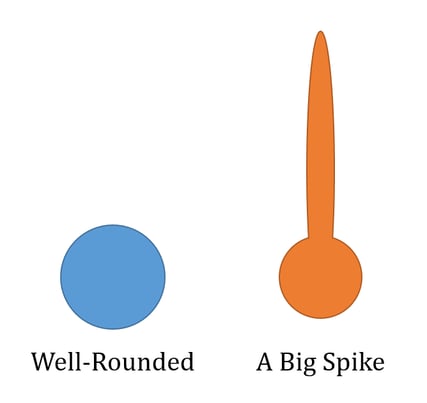
This is really important, and it’s my biggest point in this entire guide.
That spike is what sets you apart from the other applicants. This spike goes AGAINST the spirit of simply being well-rounded. By nature of being unique, you don’t fit in with all the other well-rounded applicants. You do something that truly stands out in a meaningful way.
This spike requires consistent effort, focus, discipline, and passion to grow. Ideally, this spike is what makes you world-class and makes colleges think you’re going to accomplish great things in your lifetime.
This spike comes in a lot of forms, depending on your field of interest. If you’re a scientist, it may mean doing compelling original research at your local college. If you’re a writer, it may mean publishing a book. If you’re an athlete, it may mean competing at the national level. If you’re a programmer, it may mean creating a successful app.
What we’re looking for is something truly impressive that is difficult to do and sets you apart from the bargain bin of well-rounded students.
If you’re currently dismissing my advice because you think, “there’s no way I can achieve something that unique and that notable,” please keep reading. It’s not as impossible than you think, and I would bet that you have the core capabilities for doing this. What most students get wrong is where they spend their time and what they prioritize. They also give up far too early, before they’ve achieved significant results, before they’ve crossed the major hurdles that come before success. I’m going to show you below how you might be wasting 1000 hours every year on things that don’t matter.
Don’t let fear about your own limitations hold you back into complacency.
Later on, I’ll explain a lot more about what a big spike looks like, and how you can figure out what a good spike for you can be, based on your personal interests. Keep this image in mind as we go through the rest of this guide.
In Developing a Spike, It’s OK to be Unbalanced
You can tell from my picture above that the round part of the big spike is smaller than that of the well-rounded ball. This is intentional.
I’m also telling you is that it’s OK to be unbalanced if you develop a big spike. Because colleges care most about whether you will achieve something great in your lifetime, by proving that you can do so in an area of your interest, colleges care less if you fall short elsewhere.
If you’re a science whiz, you do NOT have to be an amazing writer. Heck, you don’t even have to take AP English. MIT won’t care that you didn’t.
This is a really hard point for high achieving students to grasp. “What do you mean, I don’t need complete straight A’s and 5,000 volunteer hours, and also play basketball and tennis?”
Let me tell you from personal experience: having met a lot of incredibly talented people in my life, a lot of very successful people are incredibly unbalanced. They don’t fit your profile of well-rounded at all.
Brilliant scientists make deep achievements in pushing the boundaries of our understanding of the natural world, but some are hapless in the rest of life. The stereotype of the brilliant social misfit scientist is actually sometimes spot-on.
In contrast, athletes who have incredible control over their body and an innate understanding of physics might not be able to solve actual physics problems that well.
These are relative extremes, and you will likely be more balanced than this. But the point is clear. People who focus on something specific, especially something they’re passionate about, end up making the greatest impact. In turn, this means that focusing on something specific right now illustrates your potential for achieving even greater things later.
I’ll talk more about how this relates to your application later.
We’ve covered a lot already. To sum up the logic so far, here are the major takeaway points:
- Top colleges want to admit students who are going to change the world
- The best predictor of future success is previous success
- Because future success requires deep achievement, you should demonstrate deep achievement in high school
- Forget well-rounded. You want to develop a huge spike.
Sidebar: Sometimes, a natural reaction to this is that you know you’re capable of a lot, and that your past achievement (or lack thereof) doesn’t reflect your potential to change the world.
Your spirit is fantastic. But the rest of the world doesn’t see it the way you do.
Let’s imagine you were to get knee surgery, and your surgeon were fresh out of medical school. “I’m fully capable of doing the best knee surgery, and I care a lot about your well-being. I’ll do everything I can do make sure you do great.”
You say, “Sure – but how many surgeries have you done before?”
“This is my first one. I had a lot of opportunities to practice knee surgeries before, but I didn’t take them. But I promise you that I’ll do well this time around.”
Red flag. You would probably recoil and ask for someone with more experience. Colleges treat this the same way.
Between a person who is passionate but hasn’t shown achievement, versus a person who is similarly passionate but has shown deep achievement, Stanford will take the second one. Every. Single. Time.
That’s why prior achievement is so important.
Busting a Myth: “School Admissions are a Crapshoot for Everyone”
You may have heard often that school admissions for the Ivy League and other top schools “is just a crapshoot.” “It’s just random.” “Accept your outcome and move on.”
Here’s the truth: admissions are only crapshoots for the marginal person that the school wants to admit (i.e., the person that the school is indifferent about admitting and can take or leave).
Let’s pick a specific school: Harvard. Harvard matriculates around 1600 students a year, and they send acceptance letters to 2000 a year. Because their admissions rate is 6%, this means they get around 34,000 applications every year.
6% sounds really low. But admissions is not a random lottery. Many people make the conceptual mistake of thinking that everyone who applies has a 6% random chance of getting in.
The truth is, everyone who applies has a different chance of admission. If you’re a true superstar, your admissions chance is probably greater than 90%. If you’re a weak applicant, your admissions rate will be near 0%.
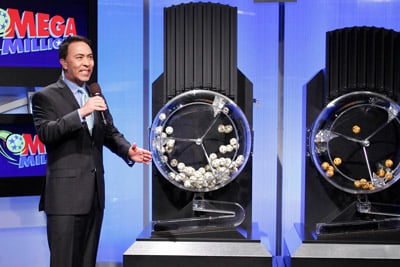
College applications shouldn’t be a random lottery, if you do things right.
Let’s work through some hypothetical numbers. None of these numbers are factual, but they should be close enough to realistic range to prove the point.
Let’s say there are 5,000 “world-class” applicants in the country. These are all people who have achieved great things in their primary area of interest, whether that’s social work, writing, scientific research, the arts, or athletics. There are 4 to 5 million high school students graduating every year, which means world-class means being in the top 0.1% of all people.
Of the 5,000 world-class people in the country, 1,000 of them apply to Harvard. (Not every world-class person is applying to Harvard because everyone’s interested in different schools, like Princeton, MIT, Yale, Stanford, Columbia, their state school, etc.)
Remember that Harvard receives 34,000 applications, so 33,000 applications are not world class. For the sake of simplicity, let’s say 28,000 of these are strong and qualified applications, and 5,000 are just totally unqualified and applying for the moon shot.
Here’s what the breakdown of applicants looks like:
| Status | Applicants |
| World-class | 1,000 |
| Strong, well-rounded | 28,000 |
| Not qualified | 5,000 |
Now, remember that Harvard gives out 2,000 acceptances. Here’s where it gets interesting.
Of these 2,000 acceptances, 900 acceptances might go to 1,000 of those world-class applicants. This is fair – Harvard wants to fill its class with the best people possible, so it gives every world-class person at shot at going to Harvard. Harvard rejects 100 world-class people because they might be huge jerks and have terrible personalities.
So Harvard has 1,100 acceptances remaining. This is still a lot of students, but remember – there are a LOT more applicants who are not world-class. So the admissions rate goes WAY down.
Let’s tabulate the acceptances for each class and corresponding admissions rate:
| Status | Applicants | Acceptances | Admissions Rate |
| World-class | 1,000 | 900 | 90% |
| Strong, well-rounded | 28,000 | 1050 | 3.75% |
| Not qualified | 5,000 | 50 | 1% |
It should be clear to you that for the group of world-class people, the chance of admissions is far higher.
When people look at the 6% overall admissions figure, it seems really hard. It seems like everyone has a 6% chance of getting in, which is why it seems like a crapshoot.
This is totally false. If you’re world-class, your admissions rate is much, much higher than 6%.
But if you’re in the second tier, then top college admissions WILL become a crapshoot.
Note that these numbers are fictional. These three bins don’t really exist, and reality is much more like a spectrum than strict categories. But I hope you get the point. If you’re world-class, you stand out like a bright star and have an incredibly high shot at getting in. If you’re well-rounded, you fall into the bargain bin of applicants who all look like each other.
(I know what you’re thinking at this point – “I’m not world-class, and I don’t know how to be.” I don’t expect you to suddenly become an Olympic swimmer or a science prodigy. But there are specific things you should do to make deep accomplishments and avoid being well-rounded. More on this later.)
Why Being Well-Rounded Hurts, Part 2
From the categories above, you can see how many more well-rounded students there are than truly stand-out, world-class students.
Well-rounded is boring. You have nothing special about you and nothing that sets you apart from other well-rounded people.
If you’re looking at a bargain bin of basketballs at Walmart, they’ll look identical. They’re all very round and seem to be equivalent to each other. Some might have slightly higher dimples than others. That’s it.

A bunch of well-rounded applicants, grouped together. How do you tell them apart?
This is what well-rounded does to you. You won’t stand out from other students. Everyone’s doing the same stuff as everyone else – taking a decent number of AP classes, doing a set of uninspiring extracurriculars like Key Club, volunteering at the hospital, etc.
And because of the vast numbers of well-rounded people out there who don’t have anything remarkably special, you have a tiny chance of getting in.
Here’s another painful fact about being well-rounded: the school doesn’t really care if YOU get in or not, compared to the next comparable applicant. This is what I mean by the “marginal acceptance.”
Here’s an exercise: I want you to think about the very best meal you’ve ever had.
Have one in mind?
It probably sticks out incredibly in your mind for specific reasons. Maybe the food was incredible, or you had amazing company, or it was a really special occasion. But your mind went to this #1 meal for a reason.
It’s clearly even better than the 2nd best meal you’ve ever had. That best meal means a lot to you.
A strong candidate for meal #1.
Now think about the 20th best meal you’ve ever had.
…
…
waiting…
You probably need to think really hard about what this even is, even though you’ve already eaten 20,000 meals in your lifetime. The 20th best meal is in the top 0.1%! But still it’s incredibly hard to remember.
And how much more do you care about the 20th vs the 21st best meal? Likely not very much.
Admissions works the same way. Top colleges care a lot about their superstars, and they want to make sure they don’t miss any of them, because this can dramatically change the flavor of their class. They don’t want to miss the next Hemingway or Mark Zuckerberg. This is why the admissions rate for world-class people is so high.
But the rest of the class? It doesn’t matter as much. Of the 1,100 well-rounded candidates from the table above, Harvard could randomly choose 1,100 from the pool of 28,000, and Harvard probably wouldn’t change all that much.
This is why you’ll often hear admissions officers from schools like Yale and UPenn say, “admissions are really hard – there are way more qualified applicants than students we can support. We have to make tough decisions.”
They’re talking about the well-rounded students. They’re NOT talking about the superstars with big spikes, who are usually clearly automatic acceptances.
When you compare well-rounded to well-rounded, it truly is a tough decision. How are you going to compare one bargain bin basketball against another?
This is the crapshoot. And the crapshoot sucks.
Having talked to admissions officers and witnessed admissions discussions at Harvard, I find it shocking how random admissions can be if you’re a marginal acceptance. Admissions officers will often go “by gut.” Something about your application can pique their interest and focus their attention. Equally likely, something about you might also give your reader a bad taste in her mouth. And now because your reader presents you to the admissions committee, suddenly you’re fighting an uphill battle.
And to be honest, if you’re indistinguishable from other candidates, your admission doesn’t REALLY matter to them. The admissions officers do honestly want to create the best class possible, but at the end of the day this will mostly sort itself out. So unless you really strike a chord in the reader, she won’t fight that hard for you.
This is the critical difference between students and colleges in how they view a single application. In your mind, your application is a special snowflake, constructed carefully piece by piece over years of your life, deserving hours of scrutiny by the school arbiters.
In their mind, they’re sorting through literally thousands of applications. The world-class standouts are clear. From the second tier bin of comparable, undifferentiated applicants, their choice doesn’t matter a whole ton. It’s hard to tell who’s better between them at this point, and everyone seems equally qualified, so largely they just go by their gut and choose people they like a bit better. This is the crapshoot.
You want to avoid the crapshoot. The crapshoot is not fun and it’s not for you.
Tell Me If This Story About Your Life Sounds Familiar
In my work at PrepScholar, I work with thousands of students across the country. This is one thing I hear over and over again:
“I just don’t have any more time in my schedule. I have a bunch of AP classes, sports practice, marching band, and volunteering. I get home late and work on homework until 1AM. I’m barely struggling to hang on and it all feels like it’s going to unravel at any second.”

Does this sound familiar? Do you see yourself fitting this profile?
I’m sorry that you’re stressed out. If you’re a high achieving student, high school is tough because admissions gets more competitive every year.
Unfortunately, most of what you’re spending your time on is probably not raising your chances of getting into Princeton.
And most likely, you don’t really love most of what you’re doing. Which makes for a pretty miserable time.
The good news is, it’s not too late for you. I’m going to talk about how you can cut out the crap and build a much stronger application while spending your time on things you really care about.
What does all of this mean for your application?
Remember my biggest piece of advice: Forget well-rounded. What you’re looking to develop is a huge spike.
Let me repeat what I said earlier. That spike is what sets you apart from the other applicants. That spike makes you hard to fit into the bargain bin of well-rounded balls. This spike requires consistent effort, focus, discipline, and passion to grow. Ideally, this spike is what makes you world-class and makes colleges think you’re going to accomplish great things in your lifetime.
This spike comes in a lot of forms, depending on your field of interest. If you’re a scientist, it may mean doing compelling original research at your local college. If you’re a writer, it may mean publishing a book. If you’re an athlete, it may mean competing at the national level. If you’re a programmer, it may mean creating a successful app.
What we’re looking for is something truly impressive that is difficult to do and sets you apart from the bargain bin of well-rounded students.
Make no mistake – this isn’t easy to achieve. There is no secret that will suddenly create something world-class for you. But it’s also probably closer to your reach than you think.
Many students try to develop a spike or a “hook” in their application. But where they fail is that they don’t put in enough time, they don’t optimize the way they achieve their goal, and they give up when the going gets rough, before they achieve something meaningful.
As I’ll soon explain, often the way you will demonstrate this spike is in your extracurriculars.
What does this mean for the rest of your application?
Aside from extracurriculars, you also have to worry about GPA, SAT/ACT, letters of recommendation, and personal statements.
Your application’s job is to support the story around this spike. Every piece of your application should be consistent with this story.
This leads to my second biggest rule: you do not need a perfect application all around.
You should focus on your strength – your spike – even at the expense of other aspects of your application.
Are you a science geek? Then you need to show that you’re super strong in math and science, but it’s ok to be weaker in English.
Are you a writer? Show that you have great talent and achievement in your writing, but you don’t have to ace calculus.
Are you being recruited for a sport? Then you don’t need to be great at academics at all – just good enough to get through college. Focus the rest of the time on getting better at your sport.
Remember – no one cares that Tom Brady isn’t a mathematician, and no one cares that Mark Zuckerberg isn’t a gymnast.
Now, you can’t totally fail in the rest of the application. There are some things you can never do, like show a serious ethical lapse or have a terrible personality. No amount of achievement will overcome the perception that you’re a huge jerk that no one likes to be around. (Remember, colleges want to admit students who will be positive additions to the community.)
You also need generally strong academics. Academics at top schools isn’t trivial, and colleges want to make sure you can survive comfortably without too much trouble. You usually can’t apply successfully with a 20 ACT, unless you do something truly groundbreaking. (I talk more about academic requirements in the FAQ, so make sure you read to the end).
So you should look generally competent in the rest of your application, and you should take challenging classes in your area of interest. But overall colleges don’t care that much about things that aren’t your single strength. Once again, your ability in your passion contributes more to your success – not being well-rounded.
What Do Strong Spike Applications Actually Look Like?
I’ve been talking abstractly for a long time. Let’s make this more concrete.
For illustration, let’s walk through two example applications for people with very different application profiles. For these, we’ll look at the major components of the application:
- Grades/GPA
- Test Scores
- Extracurriculars and Awards
- Recommendation Letters
- Personal Statement
In general, extracurriculars are where you will develop your spike. This is where you can truly stand out, since the other components are standardized between most applicants and don’t differ very much. But as you’ll see, the other pieces will all be part of your consistent story.

Profile: The Science Superstar
This student (let’s call her Sarah) is a science whiz. A current high school senior, she’s deeply interested in physics, and ultimately plans to do a PhD and conduct research in particle physics. Here’s what her application looks like:
Grades/GPA
No surprise – Sarah has aced all her science coursework. She’s taken all the major AP science and math courses (Biology, Chemistry, Physics C, Calc BC) and gotten A’s in all of these.
She’s not the best writer and finds it hard to focus time on things that don’t naturally interest her, so she’s gotten B’s on a few English and History courses. This brings her unweighted GPA to a 3.95 – not perfect, but still strong.
Test Scores
On her ACT, Sarah scored a 34 – 36 on Math and Science, and 32 on English and Reading. For her AP exams, she’s scored 5 on all the math and science subjects, and 4’s on AP English and US History.
She’s also taken SAT Subject Tests in Math 2, Physics, and Chemistry, and gotten 800 on all of them.
Extracurriculars and Awards
This is where Sarah really shines. Her largest achievement was participating in the US Physics Olympiad study camp, which selects the top 20 students nationwide after a series of demanding qualifying tests. These students are trained, and the top 5 students represent the United States at the International Physics Olympiad. She didn’t get into the top 5 as a junior, but hopes she will as a senior.
Sarah is also fascinated by science research and has worked in a biophysics research lab at her local college for the past 2 years. Throughout the school year, she spends 10 hours a week on research work but has also spent 2 full-time months for the past 2 summers working on research. Her research concerns the physics behind protein folding, with applications for infectious disease like HIV. She’s participated in nationwide research competitions like the Intel International Science and Engineering Fair.
Sarah also is a member of her school’s Science Bowl and Science Olympiad teams, though these haven’t moved beyond the state level.
In her other free time, Sarah enjoys skiing and reading as hobbies.
Recommendation Letters
Sarah has letters from her AP Chemistry and AP Calc BC teacher, as well as the camp supervisor at the US Physics Olympiad study camp. These are some snippets from the letters:
“Sarah is endlessly inquisitive, always diving deep beyond the textbook to find out the limits of what we currently know in science – and in the process stretching my knowledge as well.”
“Sarah also has an incredible warmth of personality – she was always happy to help out her neighbors to figure out their mistakes after receiving their test scores back. I noticed a halo effect where people who sat around her tended to do better than the average student in class.”
“One of the most passionate and impressive students I’ve seen in my entire teaching career.”
Personal Statement
In her personal statement, Sarah talks more deeply about her interest in physics on a philosophical level, and how her interests have evolved over the years. It provides a nice complement to her list of achievements to convey what makes Sarah tick.
Summary Assessment for Sarah
Sarah is clearly a very strong candidate that all top colleges would be happy to have as part of their class. She’s created a spike in her application by competing at the highest levels possible and making deep achievements in her field. From her competitions, it’s clear that she’s world-class in her abilities. She also seems to be a pretty cool person, as evidenced by the letters of recommendation and her personal statement.
The most important point from this illustration is that she’s not “well-rounded” in the sense that most students try to achieve. She isn’t that strong in the humanities, and this shows in her grades and test scores. She also doesn’t have filler activities that “well-rounded” students try to stuff in, like hundreds of volunteer hours, or Future Business Leaders of America, or a musical instrument.
Instead, she’s focused her time to deepen her area of interest. Where others are spreading themselves thinly by covering all bases, she’s diving deep into science and physics.
Let’s go through one more example of someone with a huge spike in his application story.

Profile: The Burgeoning Writer
Maxwell has loved crafting written language for a decade. Starting off with simple fiction as a middle schooler, he has started writing more complex works as he’s acquired more experience and learned more about himself. He’s an avid reader and devours literature constantly.
Grades/GPA:
Maxwell excels in all things related to language. He aced AP English Lit and English Language, and he’s taken electives related to writing.
For his other subjects, he’s at standard grade level. He’ll take pre-calculus as a junior, and he’s taken a few regular science classes, but he doesn’t plan on taking APs for these subjects. His GPA is a 3.9.
Test Scores:
Maxwell scored a 2200 on the SAT: 800 on Writing (with a 12 essay) and 800 on Reading, but a 600 on Math. He’s also scored 5’s on AP English Lit and English Language, as well as 800 on the SAT Literature Subject Test.
Extracurriculars and Awards
Once again, this is where Maxwell shines. His free time is focused around writing in all forms. Here are a few of his notable accomplishments:
- He’s been published in the top 3 periodicals for teen writers nationwide.
- Since freshman year he’s entered dozens of writing competitions for high school students and won top prize for a few of the most prestigious ones.
- He runs a popular blog where he comments on high school life with a satirical bent. Some of his articles have been reposted by publications like the Huffington Post, where they’ve gone viral and received hundreds of thousands of views.
- He started a writing club at his high school with the idea that students can share their work and get peer feedback on their writing. It grew to 30 students at his school, and students at other high schools have been interested in participating. So Maxwell has cobbled together an online platform where students can post their works anonymously and get feedback from viewers. He hopes he can expand the reach to the rest of the country to establish a peer network of writers.
Recommendation Letters
Maxwell asked for 2 letters from his teachers, one of whom is the supervisor of the club Maxwell started. They both speak to his genuine passion for writing and initiative in pursuing his art in a school that doesn’t have a lot of structure to support it. They also comment on his cheery personality and how he’s a class favorite.
Personal Statement
Maxwell writes a statement about his process for writing, and how it’s symbolic of his general approach to life. Of course, because of his deep experience in writing, his statement also stands out in its eloquence and vividness.
Summary Assessment
Clearly Maxwell is an accomplished writer. He’s honed his craft over years and is now producing work that’s recognized by publications. He also shows his passion and initiative by spotting a need – peer feedback for high school writers – and creating a group around it. His achievement is world-class – few other people his age who are interested in writing have achieved as much as he has.
But once again, he doesn’t have a perfect application. He’s not strong in math or science, and he’s not taking the most challenging courses in these fields. His SAT score is below average for a school like Harvard. But his spike – his writing and associated achievements – more than make up for this.
Interested in seeing what MY spike was?
Here’s my ENTIRE college application. I take you through every single page of the successful application that got me into Harvard, Princeton, Stanford, MIT, and more.
I show you my entire aplication, including my Common App, personal statements, letters of recommendation, transcript, Harvard supplement, and more.
I also provide strategic comments on how each piece fit together into a compelling overall application.
You’ll also see what I considered weaknesses in my application, and how I could have improved it further.
If you’ve liked my advice so far, you’ll love seeing my complete Harvard application.
Recapping Application Profiles
I hope the point is clear now. A big spike is truly impressive. It requires innovative thinking, hard work, passion, and focus. That’s why these achievements sound so impressive to you – they wouldn’t be so impressive if literally every student could do them. But they’re also easier to achieve than you think, if you structure your life and time the right way.
Furthermore, I want to stress that you do NOT need to be a perfect applicant to get into Harvard or Yale. In fact, there really is no such thing as a perfect applicant, because by focusing deep on something, you are necessarily making compromises elsewhere.
There is no one in the world who is an Olympic athlete, a Nobel laureate, and a legendary rapper, all at the same time. So stop feeling bad about yourself. Focus on what you like doing and what you’re good at, and keep doing it.
The deeper you go in one passion area, the more that compensates for weaknesses in other areas. The shallower you go, the more you have to compensate by being well-rounded. And, again, the more well-rounded you are, the deeper you fall into the crapshoot.
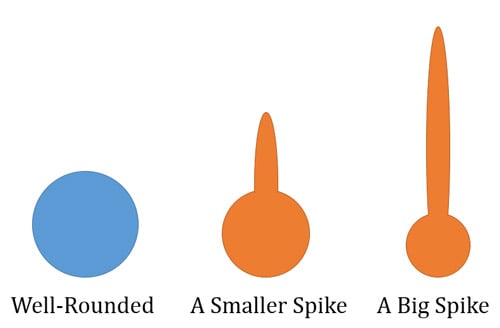
Sidebar: After saying all this, I imagine you might be asking:
“Allen, I know someone from my high school who got into Princeton and wasn’t world-class the way you’re describing.”
Did that person apply to multiple top schools, and did she get into most of those schools?
If so, I would argue that she was world-class. Once every school wants you, you’re doing something that really sets you apart and makes every school take notice. You should ask her what she did and see whether I’m right.
If not, then I would say that she was one of the lucky ones who got in as part of the crapshoot. Something about her caught the eye of an admissions officer at Harvard, which got her in. This didn’t happen at other top schools, so she didn’t get in.
I’m not trying to be a snob here. I’m sure she’s an awesome person, she’s very well qualified, she deserves her success, and she’s going to do great in life.
But if she were stronger, more schools would have wanted her.
Once again, if you’re aiming for top schools, you don’t want to be part of the crapshoot. You want to try to build yourself to a level where Harvard, Yale, Princeton, Columbia, and Stanford are all dying to give you a chance to attend their school.
OK – So Now What Do I Actually DO, Allen?
I know all of this is overwhelming. These applicants have accomplished so much that it seems like only something you read about in the news, not something you can accomplish yourself.
The reality is, there are thousands of students who achieve things like this in different fields, and you can be one of them. There’s no question that it takes focus, discipline, competency, and passion. But it actually takes less raw talent than you think. Society in general overvalues cleverness and undervalues pure determination and hard work.
Just by taking the time to read all the way down here, you’re showing that you care more about your personal success than most other students. This means that you can do it. I’m really not BSing you or trying to blow up your ego. You can make this happen through sheer force of will and structure in your life.
To make this concrete, we’re going to do a 2-step exercise.
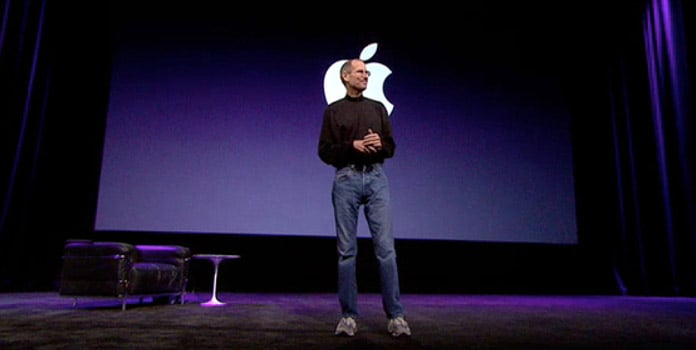
Steve Jobs: Someone who was never afraid to think big.
Step 1: Think Big – What Can Be Your Spike?
I want you to take a moment and think ambitiously, freed from the constraints you’re facing in your life.
Let’s say you had to go to school but had zero homework, and you didn’t need to do any studying or test prep. This gives you about 40 hours every week outside of school.
What do you think you could achieve in this time, over a full year, by pursuing your interests? Think big.
Here are a few examples:
- Do you like a particular academic subject in the sciences or humanities? Try to find a national level competition that you can rank well in. Find out how to excel in this competition, and work hard to meet the challenge.
- In the sciences, there are the well-known Olympiad competitions, as well as Science Bowl, Science Olympiad, and others.
- In the humanities, there are competitions for speech and debate, writing, essay, poetry, and others.
- Passionate about a unique cause? Try to start a club or nonprofit group. Use methods that you know well to raise awareness, like social media and Kickstarter. Imagine if you started a viral phenomenon like the ALS Ice Bucket Challenge. Try to do something good, in a quantifiable way – number of people helped, number of students taught, amount of money raised, etc. Imagine recruiting your friends to help you out and growing this to a nationwide effort.
- Interested in computer programming? Technology barriers have been lowered like never before. Think of a useful tool that you want in your everyday life, build it, and publicize it. How about releasing a mobile app and putting it on the App store?
- Considering becoming an academic? Try to organize your own research internship at your local college. Approach professors with a passion for learning and a long-term commitment, and they will be far more likely to consider training you.
- Have a hobby you enjoy? Think about how you can take it to a more impactful level. Can you showcase your expertise in this hobby somehow and achieve recognition? How about spreading your passion to other interested people and mentoring them?
- Don’t worry if your true interest seems silly. Interested in makeup and beauty products? Consider starting a high-quality Youtube channel catering to a niche audience, like high school students or budget-strapped buyers – imagine if you had 100,000 subscribers. What about videogames? What if you started a nationwide high school gaming tournament?
These are just the more obvious suggestions – there are a lot more better ideas that you can come up with.
You know way more about your interests than I do, and you know what’s considered exemplary in these fields. You can also come up with unique opportunities that no one else can. These are not only massively rewarding and fun for you to work on, but also truly impressive for your college application.
The key here is that you need to show something of meaningful achievement. You don’t want to just create a random Youtube channel – you want to get to 100,000 subscribers. You don’t want to just make a mediocre app – you want to get it ranked in the top #100 in the app store.
Think big.
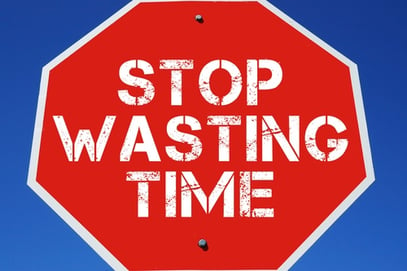
Step 2: What Are You Wasting Time On?
Now, of course, the bigger you think, the more daunting the ideas seem to implement.
The good news is, you’re likely wasting a ton of time on things that you don’t enjoy and that aren’t improving your college application one bit. If you carve these out of your life, you’ll have a ton of free time you never realized.
Here are a few major time sinks that most students fall victim to:
Classes that Don’t Fit Into Your Story
This is probably the biggest, most insidious time cost, and the most controversial suggestion in this group.
The “well-rounded” applicant hears of students taking 10 AP courses and thinks that he needs to replicate this. He’ll spend 6 hours each day slogging through the homework, thinking that 10 AP courses must be way better than 8.
Wrong, wrong, wrong.
Coursework has a property of “diminishing marginal utility.” This means the more AP classes you take, the less each additional AP class is going to add to your application. Compared to 0 AP classes, 1 AP class means a lot. Compared to 1 AP class, 2 AP classes mean a lot. But 8 AP classes is barely better than 7.
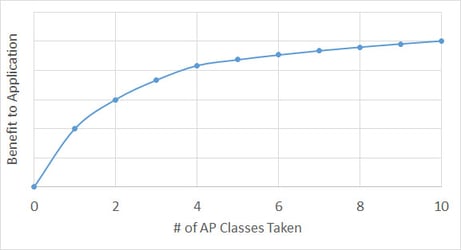
This is an economic concept that applies to a lot of things in life – whether that’s times wearing a new outfit, number of kisses from your crush, times gone to Disneyland – most things tend to follow this curve. AP Classes are no different.
How much time does an extra AP class cost you? Let’s say beyond the normal class, there’s an extra 5 hours per week of homework and studying for tests, and 36 weeks in a school year. Let’s say in preparation for the AP test, you also study for an extra 50 hours. In total, this means an extra 230 hours.
230 hours is a lot of time in one year. To put this into perspective, that’s 6 weeks of full-time work for a normal 40-hour per week job. (From personal experience, 230 hours is also multiple times more than most students spend studying for the SAT/ACT – which is a misoptimization, given how important the SAT/ACT is and how unimportant this extra AP test is).
From your passion project from Step 1, how far could you get with an extra 230 hours of time? It’s likely a lot.
The number of hours can well exceed this if the class is especially difficult at your school, or the material’s really hard for you. It might go up to 400 hours in one year.
And if you avoid taking multiple AP classes that you really don’t have to take across multiple years, this might end up amounting to 1000 hours. That’s a ton of time, and enough to get proficient at pretty much anything you want to learn.
If you hate biology, don’t take AP Biology. It’s as simple as that. Don’t be pressured into it by your high school counselor, friends, or college advisers. It’s not going to fundamentally change your application. What you do with the extra time you save can.
Unhelpful Extracurriculars
There are a lot of extracurriculars that suck up a lot of time that really add nothing to your application. Here are some common examples:
- Volunteering: Many students spend hundreds of hours per year volunteering (imagine you volunteer for 3 hours per week for 50 weeks). Most people do it because they feel like they have to. And most do it in a way that does the opposite of standing out. Tens of thousands of students volunteer at local hospitals, wheeling patients around or delivering flowers. It’s not at all special, it takes little innovation on your side, and so you get no extra points for doing this.
- Athletics: This is a super heavy activity. Between daily practice and weekly matches, you can spend hundreds of hours per year. If you’re not team captain or a standout player (meaning you rank at state level or higher), this activity does very little for your application.
- Instrument Playing: Marching band can take multiple hours per week in practice and competitions, as can extracurricular orchestras. Furthermore, you’re probably also practicing the instrument hours every week. Unfortunately, if you aren’t section leader or concertmaster, you’re not impressive. Think of all the thousands of youth orchestras and marching bands out there and how many concertmasters/drum majors/section leaders there are. And you’re not even one of them.

In other words, here are some signs that your extracurricular is a waste of time, as far as college applications go:
- It takes nothing special to do: If what you’re doing can be done easily by anyone else, it’s not groundbreaking enough to strengthen your application. For example, if getting your volunteer position means simply filling out a paper application, you’re doing nothing special.
- You’re not a leader, and you won’t become a leader: If you’re just a rank and file teammate or club member, you’re not doing anything special. Once again think about how many thousands of other organizations exist, and how many tens or hundreds of thousands of other students are in the same position as you.
- You’ve maxed out your growth: How much time have you spent on this activity already? How much further will you get with another 50 hours? If the answer is “not that much,” THOSE 50 HOURS ARE A COMPLETE WASTE OF TIME. Sorry for the capital letters. This is such a common fallacy in the many students I work with that it’s frustrating when they don’t see the logic here.
Let me expand on the last point more. A typical athlete will spend at least 500 hours per year practicing, exercising, and playing in games. This can be a valuable credit to their application. But if you’ve already spent 1000 hours on a sport, and you won’t do anything notable with an extra 50 hours (eg you won’t win a championship, you won’t make team captain), those 50 hours can be better spent somewhere else.
The same logic goes for any of your other extracurriculars, like volunteering, marching band, academic teams, etc.
I run into this problem a lot in the context of SAT and ACT studying. I see students across the country mis-prioritizing their time into things that they don’t really care much about, AND that don’t improve their application. Meanwhile, they’re unable to work on their SAT/ACT scores for over 40 hours. This is a huge mistake since SAT/ACT scores respond very well to studying, andhave a disproportionate impact on your application for the time you put in.
Don’t get me wrong – if you really truly madly deeply enjoy the extracurricular, then keep doing it, even if it doesn’t strengthen your application. If you feel like you have a real obligation to a group, and they truly rely on you, and it’s painful to think about leaving, then keep doing it. It’s good to do things that are meaningful to you and that make you happy.
But DON’T be in denial about your extracurriculars. The less time you spend on developing your spike, the less impressive it will be, and the more you will become well-rounded.
Examine all your extracurriculars carefully. If you’re neutral about an extracurricular, and any of the 3 signs above apply, cut it out, and use that time somewhere else more impactful.
Other Time Wasters
In your free time outside of school, homework, and extracurriculars, what do you do?
Chances are, you watch Youtube, Snapchat, read Reddit, or something else “unproductive.”
Few people are immune to this. In high school, I spent a lot of time playing video games like Starcraft and chatting with friends (this was before texting, so we used a program called AOL Instant Messenger. Good times).
It was easy to waste a lot of time doing these things, because they were fun and stress relieving. But they didn’t help me get anywhere.
And to be honest, now that I have an adult’s perspective, very few of those activities made a tangible long-lasting impact on my life.

I’m not saying cut off your social life and these other things. But do think about the extra value you get from every half hour you spend on these things.
Again, the concept of diminishing marginal utility comes into play. If you go an entire day without talking to any of your friends, it’s probably pretty painful. The first ten minutes you do so are awesome (“did you see Mr. Robinson’s new haircut? Oh. My. God”). But an hour in, you’re probably just talking about nothing in particular, procrastinating from doing other stuff because that other stuff seems painful.
Fun, but not meaningful.
Challenge yourself and question what you’re spending your time doing. Analyze whether you’re getting that much out of every extra minute.
And have the willpower to shut it off and spend that time doing something you really care about.
How much time can you really save?
Between all of the above, you can cobble together 1,000 hours per year. This is immense. It’s equivalent to half a year of full-time work.
Apply this time to your dream project from Step 1. In this time, you could build a new organization, or create a new mobile app, or write 10 new essays to publish, or any other notable achievement. You can do a LOT with 1,000 hours.
Like I’ve said before, many students try to develop an application ‘hook’ or spike of some kind. But they don’t spend enough time on it. They give up far too early before learning the critical best practices that make something work. They have too many distractions in their life for things that don’t help their application.
Your aim is to accomplish more than the typical well-rounded student does by focusing your time and being smart about learning from your mistakes.
Done correctly, this kind of thinking requires you to have insight into yourself and your weaknesses. This is the kind of optimization in your life that you require to achieve deep success in high school and throughout your life.
While it may seem daunting or painful at first, I will bet that you will quickly enjoy the time spent developing your spike a lot more than the time you spent just being comfortable.
Again, if you’re not willing to do this, that’s fine. Just accept that you will be well-rounded, and you will fall into the crapshoot. But if you’re willing to put in the time, you will achieve great things.
The Importance of Passion – This is NOT Helicopter Parenting
I know that developing a big spike can sound a lot like the result of “helicopter parenting.” This is the much-maligned style of parenting wherein parents force their kids to become championship horseback riders, or concert pianists, or beauty pageant contestants.
Helicopter parenting usually gets a bad rep because they’re forcing the kids into doing something they don’t want to do. This makes their kids miserable.
But the point of all my advice is to find something you’re genuinely interested in. This is important because working really hard at something you don’t care about can only get you so far.
For 8 years, I played the violin and practiced for at least an hour a day. I wasn’t passionate about this, and my mom had to structure my practice time so that I was forced to do it everyday. At the end, I became pretty good, but I was nowhere near as good as our concertmaster, who truly treated it as his passion. He worked harder at it and cared more about it, and to him I imagine each hour of practice was 100 times less painful and 10 times more effective than it was for me. This concertmaster went to Juilliard and is now a professional violinist, something I would not have been able to achieve no matter how much time I put in.
When you have passion for what you’re working on, you accomplish more, you think more creatively, and you become more resilient in the face of failure. When you really enjoy what you’re doing, you think about what you’re doing in your free time. You spend your spare time walking and using the bathroom thinking about the problems you’re facing. You work harder because it doesn’t feel like work. You’re less likely to quit in the face of hardship, and that gets you through tough times. Because you’re doing all of this, you come up with novel solutions and approaches that others don’t.
This is important because in whatever area you choose, you are competing against people for whom the same area is their true passion. If it’s not your passion too, they’ll leave you in the dust. Furthermore, colleges are typically pretty good at noticing when students are doing something only because they wanted to buff up their applications, not when they truly enjoy it.
So don’t think only about how to get into Yale, or how to get into Princeton. That’s now how you should be orienting your energy. You should be thinking about how to achieve something great in your interests – getting into Stanford is a mere consequence of this.
The Grand Overview
By this point, I hope my main points are clear. To bring it all together with step-by-step logic, here is the high level overview:
How top schools do admissions
- Nonprofit schools exist to create value in the world.
- In the process of college admissions, schools want to maximize the value that they create in the world.
- Thus, schools want to admit students who will eventually change the world.
- What does it take to change the world? Deep focus, passion, and competence.
- How do you predict which 17 years olds are going to change the world eventually? Deep, prior achievement: prior success is the best predictor of future success.
What this means for your application
- You need to develop a huge spike in your application. You need to show deep achievement in an area of your passion – something that sets you apart on a national or international level.
- Admissions is NOT a crapshoot for everyone. If you are a super strong, compelling applicant, admissions at a top school is almost certain. If you are weak, you will be rejected by every school.
- Well-rounded is the kiss of death. Well-rounded puts you in the crapshoot, because you are similar to all other well-rounded people.
What this means for what you should do
- You need to reorient your time around focusing on developing your spike. By nature of doing difficult things, to develop a big spike, you need to focus and work hard.
- Dream big. What is your area of passion? If you had infinite time, what would you try to accomplish in this area?
- Cut out everything that doesn’t matter. This means AP classes you don’t need, extracurriculars that don’t add anything to your application, and other time wasters.
I’m the type of person for whom logical arguments are the best way to persuade. So I hope this makes logical sense to you in a step-by-step fashion. If you disagree with any of the fundamental points above, please point it out to me – I’d love to have a discussion. Please feel free to leave a comment below with your situation and questions (feel free to anonymize this if you like, though the more specific you are the more helpful we can be).
Words of Encouragement
College admissions is really a microcosm of real life. If you don’t really care about what you’re doing, don’t work hard, and don’t think too hard about what you can improve about yourself, you’ll have a pretty comfortable life. If that’s the way to make you happiest, then that’s awesome. But know that you also very likely won’t achieve anything noteworthy.
But – if you dream big, take risks, and work extremely hard on something you’re passionate about, you’re in a much better position to do something great in this world. This is the way to accomplish things in the world, and it also happens to be the way to get into the top schools.
This planning is just the beginning. The hard work starts here.
First, think big. Aim high. Be ambitious. Think of a world where you’re unfettered from mundane concerns, and envision what you could achieve. That goal is closer than you think.
Next, take small steps toward your goal. What are you most afraid of right now? What is most risky? Attack that first, head-on. Learn from your experiences and reflect on what you can do better next time. Then attack the next thing. Step by step.
Throughout, keep your motivation high. You won’t always succeed. In fact, you’ll fail often. Most people give up early on. That’s why this is hard. But not you. You care too much to let that happen. If life is a track meet, you’ll turn around and look behind you to see other people on the ground, gasping for breath. But you turn around and you keep soldiering on and improving, because you care about what you’re doing and what you want to achieve.
I promise you that if you take these steps, you will achieve far more than you ever thought you were capable of. And along the way, you become an amazing young adult that every top school in the country would be thrilled to have in their next matriculating class.
Source: Prep Scholar


















